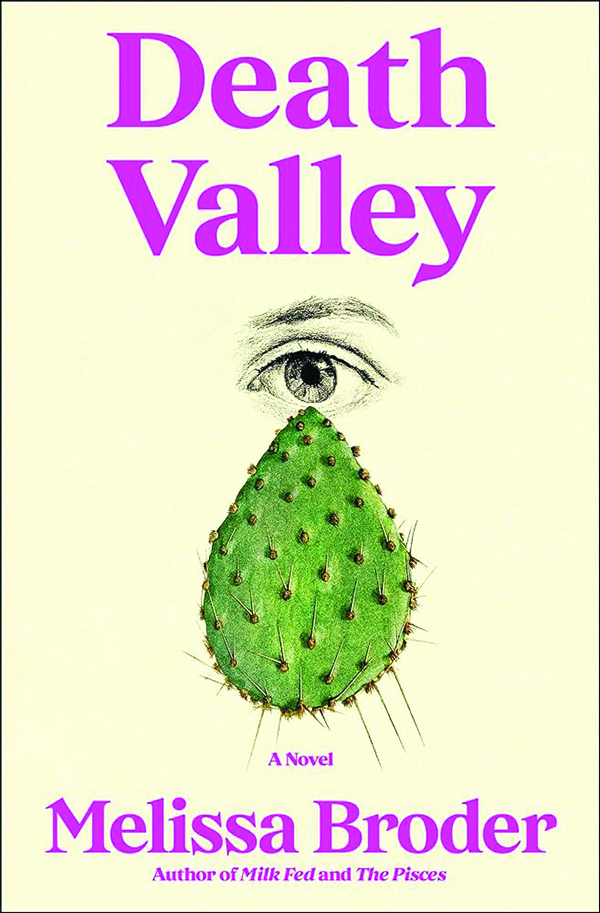
Melissa Broder brings the magic spark back to the millennial novel
Alex Perez
The unnamed 40-something narrator of Melissa Broder’s latest novel, Death Valley, is running away. A novelist, she leaves her dysfunctional life in Los Angeles and heads to the California desert, where she hides out at her favorite hotel, the Best Western. She’s attempting to escape the two men who grant her meaning but also send her into massive bouts of existential despair: her ailing father and her sickly husband.

The father, who was critically injured in a car crash and is now suffering from pneumonia, barely clings to life; the husband, afflicted by a mysterious illness, is mostly bedridden and has “debilitating fatigue. Stomach cramps and diarrhea. The inability to walk more than a block.” The narrator, burdened by anxiety and depression, is far worse off than the physically sick men in her life, and the novel follows her as she tries to get herself in psychological order, with the help of some magic. Broder, as she does in all her work, unabashedly leans into her narrator’s neuroses, getting awfully close to tipping into the melodramatic.
BARBRA STREISAND’S JUICY GOSSIP ABOUT EVERYONE, EVERYTHING, AND HERSELF
Broder, who made her name as a poet and has a popular Twitter account (@sosadtoday), developed a cult following with hilarious and hyperfeminine novels. Like her literary sisters Ottessa Moshfegh, Stephanie LaCava, and Allie Rowbottom, Broder doesn’t pull any punches in her depiction of modern femininity. When the narrator’s husband develops a new symptom, an annoying breathing pattern, Broder is at her relatably off-putting best: “On the inbreath, he makes a wet shhhing sound, like he’s underwater. On the outbreath, he makes a fainter ppp ppp ppp with his lips. This sound enrages me. Then the guilt. What kind of person gets angry at her husband for breathing?” The passage epitomizes Broder’s go-to unlikable narrator: brutal honesty bordering on the disgusting and always self-indicting. It’s a long-running literary schtick —look at me, look at how bad I am. But Broder is so sharp and funny that it works. Just barely. The fun in reading Broder is that she tests the limits with her ridiculousness. In Death Valley, which is loaded with magic and mystery, she does it again. At Best Western, the narrator meets the front desk clerk, Jethra, whose “fake lashes show their glue.” Jethra’s hair extensions expose “half an inch of solid gray showing at the root,” but the narrator, always in search of the beaten down, immediately feels a great connection with her: “I forgive her immediately as she looks to be about my age — and I know how hard it is to keep it together.” It’s with strangers like Jethra that the narrator is most honest, but with those closest to her, primarily her father and husband, she is unable to connect as deeply as she would like. It’s fitting then that Jethra sends the narrator on the excursion that will change her life, finally allowing her to open up to those closest to her.
After the narrator lies about liking hiking, Jethra recommends a nearby trail. And here is where the plot goes from one filled with one about the neurotic struggles of the modern woman to one involving, well, a magical cactus. After hiking Jethra’s trail, the narrator comes across a giant cactus with “vertical ribbing, and on the raised, fleshier parts are the spikes: star-shaped clusters of them, hundreds, maybe thousands.” After further examination, the narrator discovers that the cactus has “an injury of some kind: puncture wounds all the way from the base to the arms, like something slit it.” The emotionally unstable narrator, of course, is “strangely drawn to the wound.” She penetrates the wound with her arm, and “it’s snug, as though the cactus is giving my hand an invigorating hug,” which encourages the narrator to go deeper. She steps into the cactus, and “it’s actually easier to breathe inside the thing.” The narrator has found comfort inside a cactus in the middle of the California desert — and things only get weirder from there.
Inside the cactus, the narrator encounters a baby, who turns out to be her father. She’s seen this scene before: “In an album in my parents’ house, a black-and-white photo of my father as a little boy playing in the sand, same bucket.” Later, she returns to the cactus, where she now encounters her “father the child” as an adolescent. The cactus has manifested her father in a “black suit and a black tie,” strumming a guitar. He’s playing Bob Dylan’s “Girl from the North Country.” She shares a moment with her father, talking about Dylan.
The scenes inside the cactus border on the absurd, but Broder suffuses them with such pathos and humor that they feel absolutely true, swirling magic with metaphor. Death Valley is a constant highwire act, and just when you think that Broder is about to lose narrative control, she introduces more magic, such as when her husband, as a healthy young man before she knew him, appears inside the cactus. It’s a savvy move, introducing greater implausibility into a narrative that’s already entering unhinged territory. It works because the emotional beats are so emotionally true. Haven’t we all wanted to meet the people we love when they were younger? Broder’s cult popularity stems from the fact that in her books, she says what’s so often unsayable. Her creative output serves the same function as the cactus does for her narrator: a vessel that acts as a conduit for the dirty, embarrassing truth and the clarity it induces.
Readers’ appreciation of Death Valley will be contingent upon their acceptance and appreciation of Broder’s magical realist gambit since the supernatural element only escalates as the novel progresses. She subverts the autofictional neurotic-led millennial novel so popular with the Brooklyn set, and the result is a book that will surely polarize. One gets the impression that this is what Broder was going for, committing to the bit and challenging her loyal readership to keep going along for the ride. Autofiction, with its obsessive cataloging of minutia, can have a numbing effect on the reader. In Death Valley, the magical dimension flips the genre on its head. Personally, the narrative control and the grand epiphany in the desert, a cliche as old as Scheherazade, is so deftly managed in terms of pure narrative control that Broder won me over with her literary magic.
CLICK HERE TO READ MORE FROM THE WASHINGTON EXAMINER
Alex Perez is a fiction writer and cultural critic from Miami. Follow him on Twitter @Perez_Writes.
